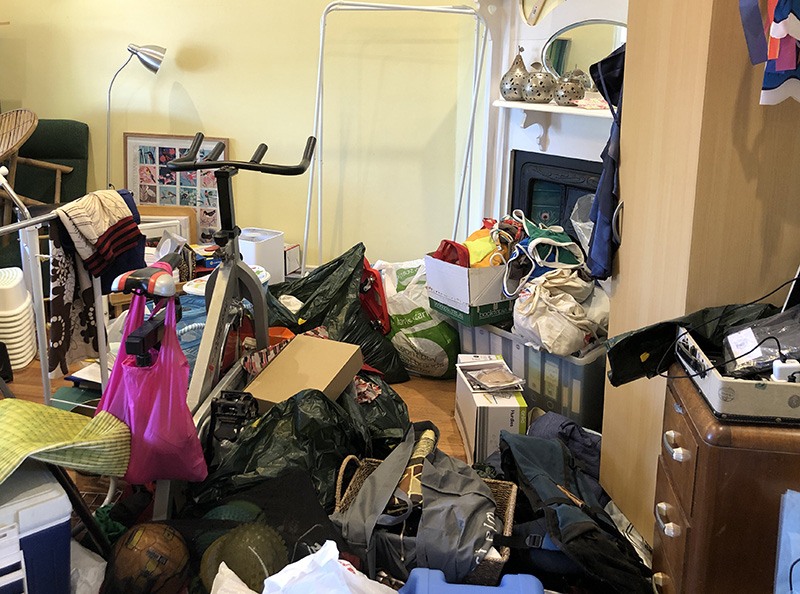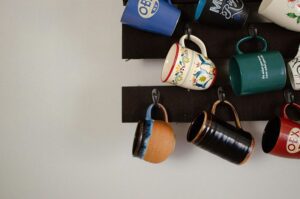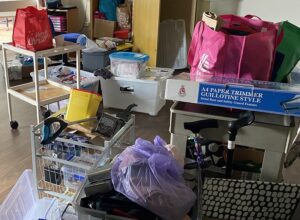
Look around and it’s easy to feel overwhelmed at the amount of clutter. As we go through life it inevitably builds up around us. Old dancing awards, too-small football boots, university text books and squeezy balls with logos on them.
It can be useful to identify the categories this clutter falls into, so here goes.
1. Aspirational clutter
Items which represent a ‘better’ future version of yourself where you are fitter, more capable, more productive. Books we would like to read. Unfinished craft projects. Fitness items. Clothes one size smaller than we have been in years. A jigsaw we feel we should do with the kids.
Usually this clutter is reserved for a magical moment when you will have spare time. What even IS spare time? Time is like money, it’s an elastic commodity which all of us have, however it is assigned differently depending on our priorities. So no matter how much we tell ourselves we should read the self-help book next to the bed, if we are dreading it we will never assign the time. And having gone through 2020 Melbourne Iso lockdown with kids, if that jigsaw was not dusted off then, it’s never going to happen.
Be the better version of you by clearing it out and making mental and physical space for your real priorities.
2. Just-in-case clutter
A second set of kitchen scales in case your main set breaks. A drawer full of keys that maybe open something. A stack of surplus bedding in case someone wets the bed twice in the same night.
We need to value the real estate our cupboards have as higher than the a once-in-a-lifetime chance of an incontinence episode. I’m not advocating discarding things you will need to repurchase really soon. However let’s be realistic about the likelihood of needing said items. The Minimalists have a 20/20 rule for Just-In-Case items: can you replace it for less than $20 in less than 20 minutes from your current location? If so, it needs to go.
3. Nostalgic clutter
This is a biggie, as we feel that these items have shaped who we are. And they are impossible to replace. Even if we can find the exact same doll we regret throwing away in 1987, it’s not our doll.
There is no blanket rule for nostalgic items because they vary vastly in their space to value ratio. One shoe box full of photos and trinkets is pretty innocuous in terms of space but can hold a whole lot of memories. Compare that to a big box containing a daggy yellowing wedding dress from a failed marriage and well, you get the idea.
If your cupboards are filling up with your kids’ drawings because you think they may want them one day, it’s actually highly unlikely. Especially if they are not interested in them now. But you could consider choosing one piece per term or per year, with your child’s help. I wrote a piece about the dreaded End Of Year School Clutter. No doubt it was penned on a frantic December eve when my to-to list was already overflowing.
It’s important to remember that
(1) the items are not the memories, the memories reside within us
(2) taking a photo of a nostalgic item is often just as useful as a memory trigger, and it takes up a lot less space.
There is a deep dive into sentimental items here.
4. Free clutter
Promotional items, unwanted gifts and hard-rubbish you just couldn’t walk past fall into this category. It’s difficult to turn down things that were free, but what happens next? And what if your KK giver from five years ago, AKA Pam from accounts realises you no longer use the mug she gifted you? Allow some time to pass if you must, but if you’re not using it, it needs to go. Pam will understand. And think twice before you get pick up the promo tote bag from the work Christmas party.
Can you think of any other categories? Take a look at this deeper dive into clutter lurking in every home.
There is further instruction here on how to assess your items.
But if after all that, you need hands-on help sorting, culling and rehoming your goods, don’t forget to reach out.






























